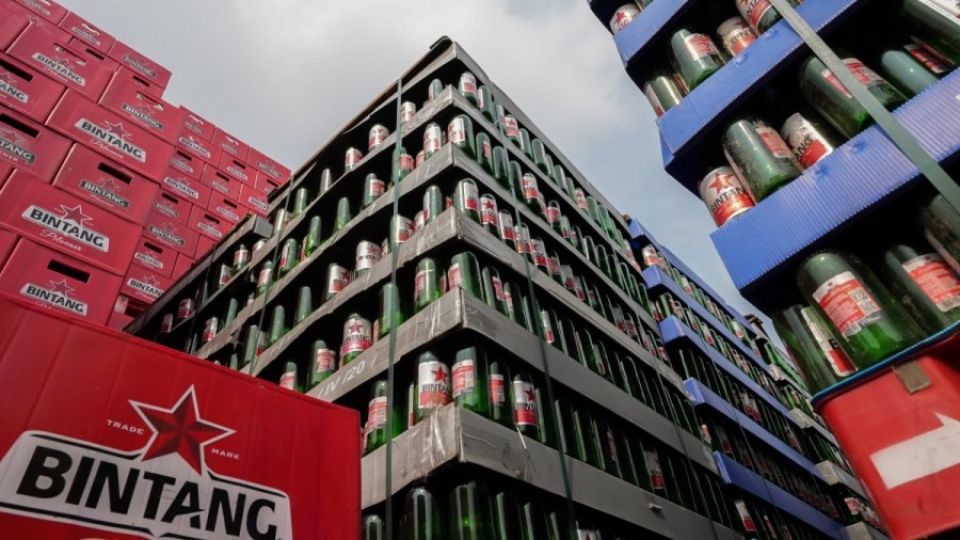June 1, 2023
JAKARTA – Having seen sales plummet by more than 30 percent and profits contract by more than 60 percent in 2020, major alcoholic beverage companies in Indonesia are in good spirits today as their industry recovers.
Business players and analysts expect a continued rise in revenue this year thanks to increasing numbers of foreign tourists and the introduction of new products. That said, the number may still be below pre-pandemic levels.
Some smaller producers have capitalized on the rebound momentum to go public at a time of growing investor appetite for the industry, as manufacturers see room for growth amid Indonesia’s low per-capita alcohol consumption.
In this year’s first quarter, almost all public alcoholic beverage firms saw topline growth. PT Multi Bintang Indonesia, the Heineken International subsidiary producing the iconic Bintang beer, reported a 9.8 percent year-on-year (yoy) hike in net sales to Rp 740 billion.
Bali-based winemaker PT Hatten Bali doubled its revenue, while Cap Tikus beer brewer PT Jobubu Jarum Minahasa booked a 5.4 percent rise over the same period. Both of those companies held their initial public offerings (IPO) earlier this year.
However, PT Delta Djakarta, which produces Anker and Carlsberg beer in Indonesia, saw its net sales drop by 1.2 percent, which it attributed partly to a seasonal drop at the start of Ramadan.
“Sales volumes of our beer actually grew in the first two months of this year but dropped in March due to the fasting month. On top of that, the alcoholic beverage trade restrictions during that month were tighter this year,” a company representative said at a public briefing on May 17.
The firm, which counts the Jakarta regional administration as one of its shareholders, is optimistic that demand for its products will rebound in the third and fourth quarters of this year.
Delta Djakarta said it expected full-year 2023 sales to be better than last year’s but not better than in 2019, prior to the pandemic.
Multi Bintang shared a similar view in its recent annual report, with president director René Sánchez Valle expecting a boost from a revival of international tourism this year but a full recovery to pre-pandemic levels only in 2024 at the earliest.
Read also: Global beer consumption rises in 2021
According to Nicodimus Anggi, research and consulting manager at Infovesta Kapital Advisori, the main growth engine for alcoholic beverage firms was a competitive edge.
He cited the case of Hatten Bali, which turned a Rp 108 million loss in the first three months of last year into a Rp 11.52 billion profit this year, arguing that the firm was able to compete thanks to having its own processing facility.
“Recent financial reports of some Indonesian alcoholic beverage firms show growth in profit margins. That indicates that those companies’ performances are improving and there is huge room for business expansion,” Nicodimus told The Jakarta Post on May 22.
New product lines
Raditya Krisna Pradana, an equity analyst at Kanaka Kita Solvera, said net sales of alcoholic beverage companies would continue to grow until the end of this year amid a growing number of foreign tourists, who tended to like to drink alcoholic beverages.
In a public briefing on Nov. 29 of last year, a representative of Multi Bintang explained that tourist destinations, especially Bali, would continue to be important for the business even though the company was working on expanding to “non-tourism areas” in Indonesia.
“We don’t want to depend on tourism, as the pandemic showed that we cannot simply rely on tourism. Indonesia has one of the lowest [levels of] beer consumption per capita, but our research shows that there is huge room to grow in this category, if we do the right thing and offer the right products to meet consumer demand,” the company said in a statement.
Multi Bintang launched Bintang Crystal during the pandemic, which it claimed was Indonesia’s first “smooth cold-brewed beer”. This year, the firm began selling Bintang Anggur Merah, a red wine-flavored beer, through offline retailers, despite not having launched it officially.
Delta Djakarta, for its part, introduced Anker Pineapple Beer this month.
“The product complements the lychee-flavored beer we launched before, and [we] will benefit from the growing popularity of this segment,” the company said in its briefing on May 17.
Read also: Cap Tikus beer producer seeks to cater to foreign market after IPO
While the alcoholic beverage market has brightened up, manufacturers also see challenges ahead.
Delta Djakarta said the firm was facing a test in increasing its profit margin amid higher cost of production inputs, especially malt, adjuncts and some packaging materials. Thus, it “readjusted” its prices this month.
Furthermore, Infovesta’s Nicodimus said there was also a risk of regulatory changes that might restrict alcohol consumption in the future.
“[If stricter regulation were implemented], that could create negative sentiment for alcoholic beverage companies,” Nicodimus noted.


